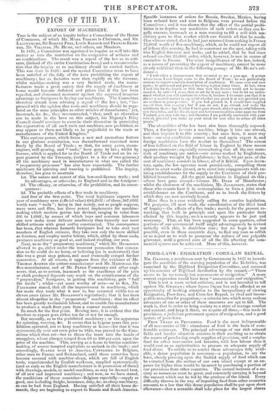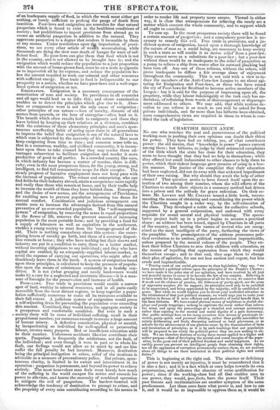POOR-LAWS: EMIGRATION: CORN-LAW REPEAL.
MR. GRAI1AM, a gentleman sent by Government in 1837 to investi- gate the condition of the starving population of the Hebrides, was examined by the Highland Emigration Committee, and summed up his account of Highland destitution by the remark—" There seems to be no remedy but assessments or emigration." A more correct expression would have been "assessments and emigration." This is not a mere verbal criticism, and is not intended to tell against Air. GRAHAM; whose lapsus lin°olue has only afforded us an opportunity of inviting attention to the inexpediency of viewing Emigration, Poor-laws, and Corn-law Repeal, as rival and incom- patible remedies for pauperism,—a mistake into which many zealous advocates of one or other of these measures are apt to fall. The truth is, that in order to bring society to a state of average comfort and content, and keep it there, we require all three,—free trade in provisions, a judicious permanent system of emigration, and a good system of poor-laws. FREE TRADE IN PROVISIONS. Food is the most indispensable of all necessaries of life : abundance of food is the basis of com- fortable existence. The principal advantage of our rich mineral fields and insular situation consists in their enabling us to obtain the means of purchasing ample supplies of provision, and a surplus fund for other necessaries and luxuries, with less labour than it would cost us as agriculturists to procure an adequate supply of food alone. To enable us to render these advantages fully avail- able, a dense population is necessary—a population, to say the least, closely pressing upon the limited supply of food which can be extorted from the surface of our own island except at an ex- pense far higher than would be incurred by purchasing a portion of our provisions from other countries. The annual increase of a so- ciety so numerous must be great, and constantly carrying it beyond the amount which can be fed by the produce of the island. Every difficulty thrown in the way of importing food from other countries amounts to a law that this dense population shall be put upon short allowance—that a scramble shall take place for the largest shares
of an inadequate supply of food, in which the weak must either get nothing, or barely sufficient to prolong the pangs of death from inanition. Poor-laws and emigration are remedies for that natural pauperism which is found to exist in the healthiest conditions of society; but prohibitions to import provisions from abroad go to create an artificial pauperism in addition to the natural. They aggravate pauperism to a degree that renders it incurable by these or any means. Under restrictions upon tin importation of provi- sions, we see every other article of weilfh accumulating, while thousands are dying the slow sure death of hunger for want of suf- ficient food. No poor-laws can give them that food which is not in the country, and is not allowed to be brought into it ; and the emigration which would reduce the population to a just proportion with the amount of home-grown food, must be on a scale so gigantic as to impoverish all by its expense, and reduce the population be- low the amount required to work our mineral and other resources with sufficient energy. Free trade in food is indispensable to our prosperity as a nation, whether we have poor-laws and a well-regu- lated system of emigration or not. EMIGRATION. Emigration is a necessary consequence of the constitution of man and society. Its prevalence in all countries and all ages would lead us to infer this ; and closer examination enables us to detect the principles which give rise to it. Abso- lute or comparative want is not the only cause of emigration : other principles of our nature —love of novelty, distaste of old scenes from quarrels, or the love of enterprise—often lead to it. The benefit which often results both to emigrants and those they leave behind by keeping up their relations at a distance, combines With the existence of these elementary principles and men's spon- taneous unreflecting habit of acting upon them in all generations to impress the belief that emigration is one of the natural laws to which man is subjected by the necessity of his nature. Men must keep emigrating from time to time ; and common sense tells us, that in a numerous, wealthy, and civilized community, it is incum- bent upon them to take counsel how they may render these ad- vantages subservient to facilitate emigration and render it more productive of good to all parties. In a crowded country like ours, in which industry has become a matter of routine, there is diffi- culty, even in the most prosperous times, for the young, strong, and intelligent, to find full remunerative scope for their energies. The steady progress of lucrative employment does not keep pace with the increase of population. The robust and enterprising, who can find fields for their industry abroad, attain a competence more rapidly and easily than those who remain at home, and by their traffic help to increase the wealth of those they leave behind them. Enterprise, and the desire of new scenes, are the arrangements of Providence for enabling men to prevent population becoming too dense for mutual comfort. Combination and judicious arrangement can enable men to increase the advantages derived from this natural preventive of an over-crowded population. The "self-supporting system" of emigration, by removing the sexes in equal proportions in the flower of life, removes the greatest amount of increasing population in the most portable form ; and by providing a fund for a supply of labourers as well as capitalists in the settlement, enables a young society to start from the 'vantage-ground of the old. There is nothing compulsory about this system : the enter- prising lovers of novelty go forth, and those of a contrary disposi- tion remain at home ; they who have nothing but their sinews and industry are put in a condition to carry them to a better market, without incurring obligations to any individual ; and they who have capital are enabled, by an adequately-supplied labour-market, to avoid the expense of carrying out operatives, who might after all thanklessly leave them in the lurch. A system of emigration based upon these principles, is calculated to keep the pressure of popula- tion upon the means of subsistence constantly in a healtky con- dition. It is not (what grasping and needy landowners would make it) a cure for a neglected and inveterate disease—it is a mea- sure of foresight for the preservation and increase of health. Poost-raws. Free trade in provisions would enable a narrow spot of land, wealthy in mineral resources, and in all parts easily accessible from the most distant regions, to keep together a popu- lation sufficiently numerous to make all its resources available to their full extent. A judicious system of emigration would prove a self-adjusting drain for preventing the population ever exceeding this amount. Combined, they would keep the aggregate society in a prosperous and comfortable condition. But even in such a society there will be cases of individual suffering, small in their proportional number, yet numerous enough to create a large amount of human misery. A defective constitution, physical or mental, by incapacitating an individual for well-applied or persevering labour, creates many paupers. Bad or insufficient education adds to their number. Unforeseen accidents likewise contribute their quota. Pauperism is frequently the misfortune, not the fault, of the individual ; and even though it were in part or in whole his fault, our feelings would not allow us to stand by and see him suffer the full penalty he had incurred. Moreover, destitution being the principal instigation to crime, relief of the destitute is advisable as a measure of precautionary police. But private, spon- taneous charity, is limited in its extent and intermittent in its operation : pauperism is permanent, and beyond its power to relieve entirely. The most benevolent man feels most keenly how much of the suffering in the world escapes his notice and exceeds his power to alleviate, and learns the necessity of combined operation to mitigate the evil of pauperism. The hardest-hearted will acknowledge the tendency of destitution to prompt to crime, and the propriety of every man contributing according to his means in order to render life and property more secure. Viewed in either way, it is clear that arrangements for relieving the needy are a matter which concern the whole community, and to support which all ought to contribute.
To sum up. In the most prosperous society there will be found a certain amount of pauperism ; and a compulsory poor-law is ne- cessary to remedy this evil. Free trade in provisions, and a ju- dicious system of emigration, based upon a thorough knowledge of the nature of man as a social being, are necessary to keep society in such a state as will enable it to derive relief from a poor-law. They cannot serve as a substitute for a poor-law ; but a poor-law without them would be as inadequate to the relief of pauperism as a pump to relieve a ship from water after its outward planking had been torn off. Any one of these reforms, without the others, will prove inadequate to diffuse a fair average share of enjoyment throughout the community. This is not said with a view to in- duce the members of the Anti-Corn-law League to set about agi- tating for Emigration and Poor-laws, or those who have raised the cry of Poor-laws for Scotland to become active members of the League : but it is said for the purpose of impressing upon all, the propriety, while they labour indefatigably at the task each has un- dertaken, of refraining from words of discouragement or disparage- ment addressed to others. We may add, that while zealous de- votion to one reform is as much as can well be asked for from private individuals, and far more than has hitherto been obtained, more comprehensive views are required in those to whom is con- fided the task of legislation.



























 Previous page
Previous page